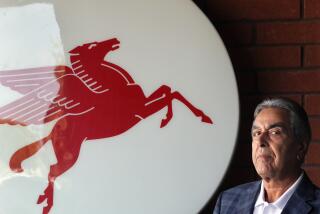In Search of Quick Bucks in Fast Lubes : GM and Ford hope to recapture service business by offering speedy oil changes.
- Share via
SAN DIEGO — General Motors and Ford have finally come around to what the Jiffy Lubes of the world have known for years: There is big money to be made in quick oil changes.
Both auto makers have announced in the last month or so that they are entering the quick oil change business on a pilot basis, joining Jiffy Lube International, units of Valvoline and Quaker State and other companies in a fast-growing market.
Both GM and Ford hope to recapture the service business that their car dealerships have lost to the quick-change outfits, and to improve their images with motorists who don’t think that dealers have the time or inclination to do small-ticket maintenance work.
Huge Profits Not Expected
GM said two weeks ago that it had begun offering “Mr. Goodwrench Quick Lube Plus” service at 94 of its dealerships in four test markets: San Diego; Birmingham, Ala.; Columbus, Ohio, and Pittsburgh. If all goes well, the service could be available at as many as 3,500 of the 9,700 GM dealers in the nation by the first of next year.
Jim Powell, parts and service manager at John Hine Pontiac of San Diego, one of 28 San Diego County GM dealers participating in the pilot program, said he does not expect it to generate huge profits. Rather, he said, the hope is that the service will build customer relations and thus improve car sales.
“GM is wanting to sell its oil and filters, and dealers want to keep customers coming in on a more regular basis,” Powell said. “We make some money (on oil sales), but as far as a whole lot, no.”
Modeled after the low-price, quick-service formula of Baltimore-based franchiser Jiffy Lube, the GM dealers will charge about $21 for oil, filter and a 10-point maintenance check. Customers are guaranteed that they will be back on the road after no more than 29 minutes or the next oil change will be free. That’s slower than some competitors, but GM describes it as a “more credible” turnaround time.
GM’s action followed Ford’s announcement April 21 that it had begun offering “Motorcraft/Ford Fast Lube” at 20 dealerships, including Theodore Robins Ford in Costa Mesa. The Ford package costs $19.95, and service within 15 minutes is guaranteed. Ford expects to expand the program to perhaps 500 of its 5,700 U.S. dealerships by the end of the year.
Chrysler Corp. spokesman Tom Houston said Friday that, for the time being, Chrysler does not plan to offer quick-lube service. The company looked at quick oil changes two years ago and decided that there were too many “geography” problems on dealer lots that might make it impossible to “deliver the convenience that the quick-lube places already deliver.”
“If Brand X and Y make a zillion dollars doing it, we aren’t loathe to admitting we are wrong, and we’ll take another look at it,” Houston said. “This is a highly competitive business, and everyone watches what everyone else does.”
Up-front costs to the GM dealers are relatively low: They promise to dedicate one or two service bays to the oil change service and man them with employees in special uniforms. With no “brick and mortar” costs, dealers will end up spending only about $20,000 each--mainly for signs and advertising, although GM is pitching in with nationwide marketing.
That compares to a start-up cost of $490,000 or more for a typical Jiffy Lube franchisee (at least $370,000 for the site and building, and $120,000 or more for the franchise, equipment, working capital and inventory).
Although making a small investment, the auto makers think that they can dominate a fast-growing market. Dave P. Robison, director of marketing for GM Service Parts Operations, said stand-alone, quick oil change outlets now do $4.4 billion in annual sales. He expects the number of stand-alone outlets--not including those planned by GM and Ford--to double, to about 6,000, by 1992.
Conceding a “fast start and name recognition” to Jiffy Lube, Robison said, nonetheless, that he expects GM to become the leader in quick oil changes. “As the business grows more mature,” he said, “there will be a small number of very large players with an awful lot of outlets.”
There are risks: Robison admitted that GM is nervous about its dealers’ ability to get customers in and out within the prescribed time. Also, many dealership locations are not as convenient as franchise outlets, which typically are in high-traffic, commercial areas where motorists can easily stop for service.
‘Change in Perception’
Both car companies see quick lubes as a sure-fire way to help them win back customer trust, which is critical to car sales but has been declining in recent years. Robison said most car owners view going to a dealership for service--even for something as minor as an oil change--as a time- and money-consuming proposition that is best avoided.
“Our studies have shown the customer has never been able to associate fast service with any manufacturer dealership, and I’m not talking just about GM, but Ford, Toyota, Honda and all the rest,” Robinson said. Successful quick-lube service could change that perception, he said.
Because Ford’s sales have grown faster than its network of dealer-service facilities over the past decade, it is not unusual for Ford owners to wait two weeks for an oil change appointment, Ford spokesman Michael Parris said. That’s not good positioning in a market where Americans are, to use Robison’s phrase, “increasingly time-impoverished.”
Jiffy Lube has indeed become synonymous with the quick-lube industry. Although the franchiser has gone through some rough patches financially, it is still growing rapidly, with 1,050 outlets, up 26% from 823, as of March, 1988. Jiffy Lube’s systemwide sales are expected to reach $350 million for the fiscal year that ended March 31, up from $252 million the previous year, spokeswoman Joan Stephens said.
Stepped Into Vacuum
Apart from customer dissatisfaction with dealers, Jiffy Lube and the other chains have benefited from the disappearance of the full-service corner gas station, where motorists once went for oil changes and other minor services, said Franklin Morton, an analyst with Alex. Brown & Sons in Baltimore.
“That’s forced a significant portion of auto owners to look elsewhere for their lube needs,” Morton said. Into that vacuum stepped Jiffy Lube and other pioneers, he said. “Now, the auto companies have seen the success of some of these operators and decided to go at it on their own.”
Other major players in the quick-lube game are motor oil companies Quaker State, which owns Minit-Lube, and Valvoline, a unit of Ashland Oil, with its Rapid Oil Change outlets. Pennzoil recently helped Jiffy Lube with refinancing as a means of safeguarding one of its most important distribution channels.
Stephens said the entry of Ford and GM will do no serious harm to Jiffy Lube franchises because “the quick-lube industry only has 6% of the oil change business. That means there is a huge (untapped) market out there.” More than half of all oil changes are done by the car owners themselves, she said.
John Reddan, an analyst with Moran & Associates of Greenwich, Conn., is not so sure that Jiffy Lube and the other chains won’t suffer.
“People like GM and Ford will create a big wake that could swamp the little boats out there,” he said.
CHECK YOUR OIL?
The oil-change market is divided evenly into two basic segments: mechanic-installed and do-it-yourselfers, with about 50% each. Figures below are for 1986, the most recent data available.
Do-It-Yourselfers: 50% Gas Stations: 14% Independent Repair Shops: 10% New Car Dealers: 15% Quick-Change Centers: 6% All others (includes volume retailers and other specialty outlets): 5% Source: Shearson Lehman Bros. Holdings






